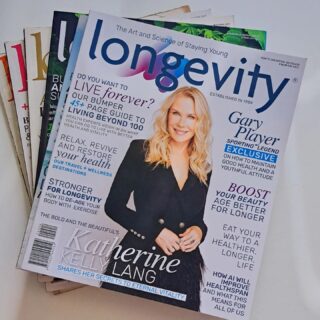It’s one thing to encourage healthy lifestyle habits for longevity, but can we afford to live to 100? The post-COVID-19 economy has not been an easy one. While enjoying a healthy body into our 70s is ideal, it would be an even better experience if our wallets were just as healthy. So, can we truly afford to live forever? We spoke to actuarial scientist Bjorn Ladewig about how much we need to live beyond 100 years.
Longevity and Your Finances
“The good news is we’re living longer. The thing to think about then is what do you do financially because you’d want to live long enough that you don’t outlive your money.” – Bjorn Ladewig
As an actuary, Bjorn Ladewig works with the team to determine annuity incomes for retirees. A life annuity is priced to pay back the purchase price based on average life expectancy. This income is guaranteed and will be paid for the rest of your life.

Bjorn Ladewig
As head of distribution and marketing at Just SA, Ladewig and the team are specialists in retirement income and focus on innovation in the annuity space to provide retirees with a better later life.
“We take over the longevity risk from a pool of lives, and in that pool, we subsidize those that live longer than expected.”
Ladewig adds that you’d expect the remaining population to live longer than expected because co-morbidities are always a challenge, thus people who have survived through that would live longer. Then there’s the added involvement of longevity drugs, which continue to grow in access and popularity,
“The important thing when it comes to finances is that you can’t plan up to life expectancy only because there’s literally, by definition, a 50% chance that you’re going to live beyond that.”
For instance, Ladewig explains how a 65-year-old male is typically expected to live to 82, whilst females are likely to like to 87, particularly those who are able to afford a type of lifetime income.
With that, Ladewig emphasizes that caring for the older ladies in our society, financially, is extremely important.
Aging brings pricy diseases
While we’re witnessing the growth of longevity drugs and innovations in healthcare, this does not mean that every individual is prioritizing healthy living as the years go by,
“One thing to carefully consider is, as we live longer, it does seem that sometimes we live slightly longer unhealthily too.”
With aging comes an increased risk for a number of chronic diseases, and a hefty treatment price tag. For example, one report found that, on average, people with diabetes incur annual medical expenditures of $19,736, of which approximately $12,022 is attributable to diabetes.
Your health is truly the most expensive investment that you’ll make, and if you want to ensure that it doesn’t leave you in unhealthy debt, Ladewig recommends that you start saving, and saving well.
Saving for longevity
“We live in a world where many things that we do or do for our kids or for other people just cost money. Inflation is also real, so it’s not that easy to save.”
With savings, Ladewig suggests that you try to get to a point where, in considering what kind of income or expenses you will have in retirement, you save 25 times that by the time you retire. However, it is important to remember that retirement planning isn’t just about saving; it’s also crucial to consider how taxes will impact your future finances. To help estimate your future tax situation and plan accordingly, you might find it useful to use the Taxcaster tool from TurboTax, or some other similar tool.
“This generally gives you enough finances to even last through those difficult years when chronic conditions like dementia can become quite debilitating. However, at least the funds and the finances are there.”
If you’re worried about your financial literacy, there is no shame in improving it – it’s definitely worth the cost.
“Get a financial advisor because they are just well-trained at helping with planning. Once you have a plan, it does free you up to live for life.”
However, there’s also the downside of planning too much. As Ladewig explains, parents are so often so keen on leaving a financial legacy or inheritance that they end up ironically sometimes making decisions that mean exactly the opposite,
“Ironically, or very sadly, they become dependent on exactly those people who they were looking out for. So first, make sure that you have an income plan and a retirement income plan that is sustainable, as that’s the best gift you can give them.”
Plan yesterday for forever
So, with all that said, when is the best time to start financially planning for your 100th birthday?
“The answer was yesterday. And if you didn’t start yesterday, then today is still also okay.”
Ladewig adds that any small bit helps, and the quicker you start, the more it builds on to that thanks to compound interest.
“Be selfish, in the sense that you make sure you have an income that is sustainable, and that just gives you that comfort to know that you can fall back on that to make sure you enjoy the rest of your life.”
Grab The Latest Issue of Longevity Magazine
Are you interested in understanding the role of finances in achieving longevity? 
Access a digital copy of our How to Live Beyond 100 bookazine via Zinio to find out more. Alternatively, readers living in South Africa may purchase a hard copy from select retail stores.
Watch the Interview
View this post on Instagram
View this post on Instagram
Grab The Latest Issue of Longevity Magazine
Are you interested in understanding the role of finances in your longevity journey?
Access a digital copy of our How to Live Beyond 100 bookazine via Zinio to find out more. Alternatively, readers living in South Africa may purchase a hard copy in select retail stores.
References
Parker, E. D., Lin, J., Mahoney, T., Ume, N., Yang, G., Gabbay, R. A., ElSayed, N. A., & Bannuru, R. R. (2024). Economic Costs of Diabetes in the U.S. in 2022. Diabetes care, 47(1), 26–43. https://doi.org/10.2337/dci23-0085



![women [longevity live]](https://longevitylive.com/wp-content/uploads/2020/01/photo-of-women-walking-down-the-street-1116984-100x100.jpg)










